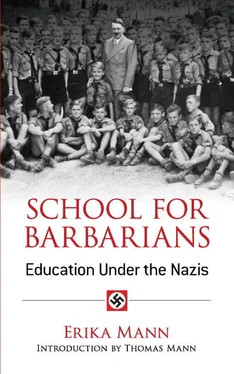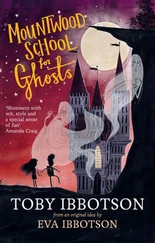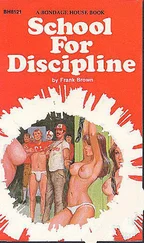There are other signs. Voices find the outside world. They are voices of young workers, students, men of deep religious convictions, and their expressions are of wrath and hope. Here is the spectacle of a country — uneducated politically, seduced by romantic nationalism and a charlatan who said he was a savior — whose moral and spiritual resources as a country are now forced underground. The forces still live. In the past, they nourished all the greatness of Germany. They survive; they cannot be withheld from the soul of a people; in the end, they are the highest concepts of human life, and they triumph, they emerge in the end.
IN NEW YORK, I LIVE IN a small hotel on the East Side. It is a pleasant hotel; the management advertises it as “continental.” But I like it for its American details — closets and showers — no luxury in this country, of course, but I cannot help being pleased by them.
I have bought a tremendous quantity of cookies, candy, and some small white dice called marshmallows — sweet, tough, as elastic as rubber, and a little like Turkish delight. I tried one, and nothing could induce me to go on. But I bought the candy against the visit I am expecting, not for myself. There are going to be two guests to eat these cookies and candy: two boys who go to school in Connecticut and are spending this week-end with an aunt in New York. They are seven and eight years old, and came over alone from Germany eight weeks ago.
I saw the smaller one when he was two, in Germany; all I know about him is that he is called Till and that his mother worships him. The larger boy was good-looking and robust, a dark boy named René after a French uncle. Their mother was French, before she married a German lawyer, and both parents (who had been divorced before, around a lot, and had wide knowledge of the world) were deeply disturbed about their sons’ future. The mother said to me as I left Germany, “I wish you could take us with you — or, at least, take the boy!”
And now the boys are here. Their parents separated voluntarily from them, and at enormous sacrifice fought with the Nazi authorities for permission to send their sons to America. “It couldn’t go on any longer,” my last letter from their mother said, “it couldn’t be looked at…. Look after the kids a little — ah, Till is still so small! And let René tell you stories, he’s bright and very grown-up for his age.”
Will he like marshmallows?
The telephone rings, and a small voice asks, in English, “Can we come up?” That must be Till; and I answer in German, “Yes, of course, come up!”
The first one must be René; then, unrecognizable, little Till; and, behind him, a third boy comes forward slowly. His bare head is covered with dark curls; deep blue eyes watch from his face that is tender and sensitive, although his brown skin and his healthy appearance are not delicate; he is broad-shouldered although of course a little thin, and holds himself a little in restraint. As I look at him, Till holds out his hand, and I realize that the boy I thought was René is not he at all, but a friend of theirs. He is American, and is wearing a kind of scout’s uniform; he turns his cap in his hands — the scratched hands of the sort of boy who plays Indian; he looks like a child Lindbergh. Till is tiny for a seven-year-old; he might be five, except for the shrewdness of his look. His hair is smooth and silky, and hangs halfway over his ears in a pageboy cut. Under his bangs, his tilted, bright eyes give his face a Slavic touch, and with his broad cheekbones and wide, finely-cut mouth, he might be Russian or even Finnish — and he is the son of a North German and a Frenchwoman. He is the man of the world among us, and introduces the little American to me. “This is Bruce Findley,” he tells me, glancing at him admiringly, “and this,” he says to Bruce, “is the lady who (in English), as we hoped, is going to take us to the movies tonight.” Bruce nudges him and they look around at René, who has been wandering around the room, and has stopped in front of my desk. He is staring at the portrait of his mother, very like him except for the brown eyes, and without taking his eyes away from it, he says, “When it hooted, everyone had to get off the boat. Mother stood below in the crowd, and I hid behind a post. But we didn’t sail for a long time.” His voice is husky; this is the first time I have heard it. “I waved,” interrupts Till, “ I didn’t cry….” He has discovered the marshmallows. “Sailings are always sad,” I say to René, with my hand on his shoulder. “Here, let’s have some chocolate.” Bruce is showing his consent. He nods and rattles off, “ Schnitzelbank, Grüss Gott, Heidelberg, gemütlich, auf Wiedersehen! ”
‘That’s his German,” Till explains. “He can say five things.”
Till and Bruce concentrate on the candy while I make hot chocolate. René is looking around the room. “Nothing but American books?” he asks. “Don’t you read German books any more?”
I tell him how much I like to read German, but that it is very important for me to get to know American books now. Till agrees, with his mouth full, “I only read American books!” he says.
René laughs. “And he can’t speak German any longer!” he exclaims, with a curious mixture of contempt and envy. “Imagine forgetting so fast!”
But Till will not let that go by; he comes back defensively, “René drags his Hitler dagger around with him,” he accuses, “and he’s got his armband on, someplace, too!”
I look across at René’s lowered head. “Why do you do that?” I ask him. “Did you like the Jungvolk so much?” He shakes his head, very hard.
“Oh, it’s not his dagger,” Bruce cuts in, explaining for him, and trying to shut Till up. “It’s Gert-Felix’s dagger, and armband, too.”
“Yes.” René looks up. “And Gert-Felix was my friend.”
Till’s mouth is still full. “But he’s dead!”
“Yes,” René repeats, “he’s dead. The doctor said he must have died a minute or two after the shot.” I begin to remember a story of their mother’s about an accident during night practice. “It was really almost murder,” René is going on, “no matter what the paper said.” Bruce’s arm is around his shoulder; it is hard to believe that the little boy with his toughness and his scratches can be so solicitous. “Everyone was supposed to bring rifles or pistols,” René says, “but Gert didn’t have any, and neither did I, so we brought flashlights, they were next best. Our leader was practicing aiming in the dark. We would hold up the flashlights and he would try to hit them. He was a fine shot, and it went very well at first. Then he went off his aim, and hit August in the knee. August didn’t cry when he fell down; it was probably just a nick. We tied it up with our armbands.”
“What did the leader say?” I asked. Bruce was listening to the German version of a story he must have known by heart in English as if it were a Wild West adventure.
“Oh, he swore, of course. August was holding his light too low, anyhow. Then it was Gert’s turn. He was good and afraid, and held his light as high as he could. The leader was a little afraid, too, I guess. He shot to the left, and that was where Gert’s forehead was. The light didn’t go out. Gert didn’t move at all. But the sound was different, as if it had hit a tree. Gert started to sway a little.”
Till goes on with the story as though it were his turn. “Then he fell over,” he recites. “First they put handkerchiefs on the wound, and when they were all covered with blood, they tried sticking moss in. He didn’t speak or groan again; the army surgeon said that was a good sign.”
Читать дальше












